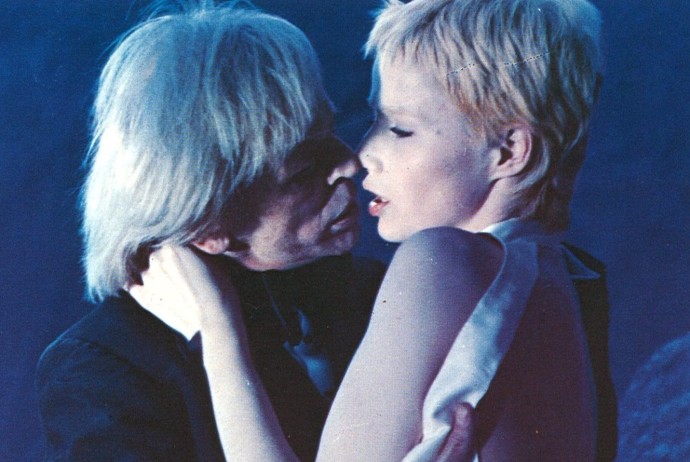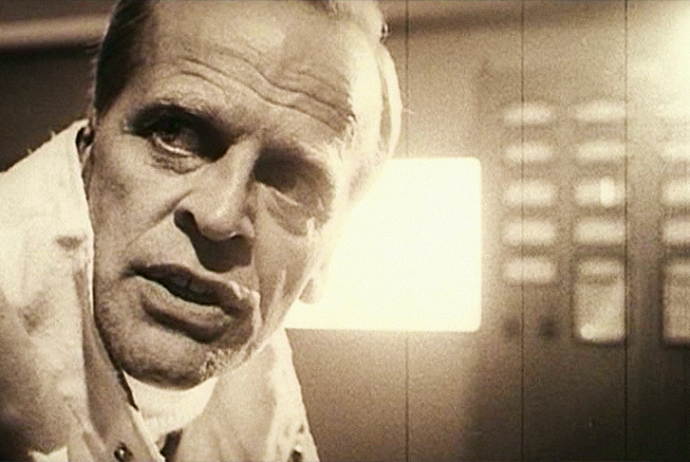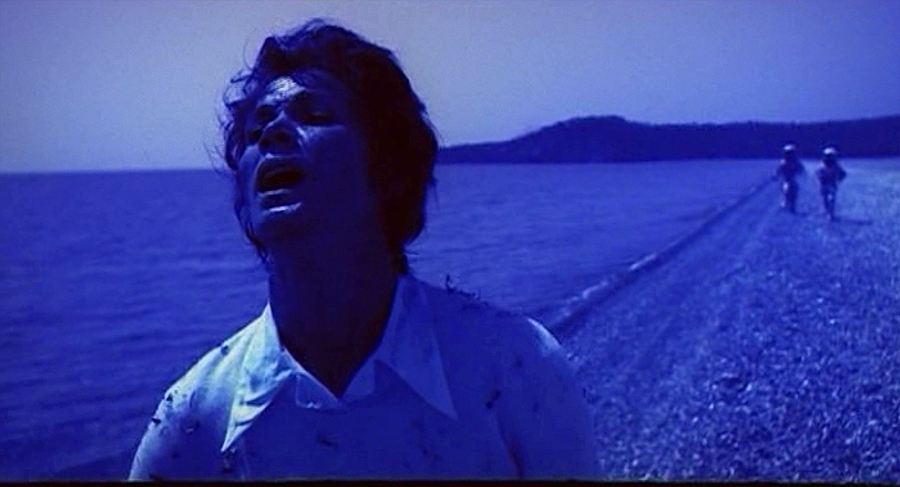Dir: Alain Fleischer
Star: Catherine Jourdan, Klaus Kinski, Pierre Clémenti, Piéral
There are probably stranger movies out there, but I’m not sure I’ve seen one. This is the kind of film, carrying massive artistic pretensions of “meaning,” which would typically have me gnawing my own limb off to escape. I think if I had actually been forced to sit down, and devote my entire attention to this nonsense for its full running-time, that would likely have been the case. But, I will confess, I took advantage of the subtitles, and spent the last 50 minutes running on our treadmill. This is probably not the way the makers intended their creation to be appreciated, but what can I say? It worked for me, and I would recommend something similar to viewers, since this probably works better as background art, like a painting on the wall of a room, rather than as something to which you must devote your full attention.
I can’t really provide much of a coherent synopsis here, since obscurity is the film’s middle name. I’m going to crib shamelessly from other sources. Unfortunately, when you Google “Zoo Zero”, the IMDB.com information says “A cruel dictator rules a Latin American state. Corruption, brutality and exploitation are present every day. A few people begin to organise resistance.” Two things worth mentioning. Firstly, that’s actually the synopsis of another Kinski movie, Kommando Leopard. Secondly, such is the obscurity in which this wallows, it’s not implausible this could be the synopsis here too, because there are definite references to what appears to be the death of General Franco. Fortunately,. Letterbox.com is slightly better informed:
Eva is a singer in a Noah’s Ark themed nightclub, where the guests wear animal masks. She sings about a doomed love affair between a lion tamer and a lion. She is approached by a stranger who claims to know her and to remember her singing Mozart which she denies. Driven around in her midget manager´s limousine she encounters bizarre characters who turn out to belong to her incestuous family of ogres.
 At this point, I’m tempted to insert a clip from Doctor Who, which has David Tennant saying “What?” for about 30 seconds. But I can’t argue with its overall accuracy either, and it has a dream-like atmosphere which means that you just have to roll with its own surreal logic, as the surreal events unfold. They climax in Eva (Jourdan, best known for her supporting role in The Girl on a Motorcycle) and Yavé, the zoo manager played by Kinski, running around the zoo, while arias from Mozart’s The Magic Flute play. Oh, and Yavé speaks entirely through a computer-controlled vocoder; it’s not clear if this was ever even actually Kinski speaking the lines, and they were subsequently treated electronically, or if he managed to get a pay-check, purely for showing up and looking suitably intense.
At this point, I’m tempted to insert a clip from Doctor Who, which has David Tennant saying “What?” for about 30 seconds. But I can’t argue with its overall accuracy either, and it has a dream-like atmosphere which means that you just have to roll with its own surreal logic, as the surreal events unfold. They climax in Eva (Jourdan, best known for her supporting role in The Girl on a Motorcycle) and Yavé, the zoo manager played by Kinski, running around the zoo, while arias from Mozart’s The Magic Flute play. Oh, and Yavé speaks entirely through a computer-controlled vocoder; it’s not clear if this was ever even actually Kinski speaking the lines, and they were subsequently treated electronically, or if he managed to get a pay-check, purely for showing up and looking suitably intense.
The film certainly looks lovely, with the art department and lush, blue-drenched cinematography making for a picture that’s pretty as a picture. The characters seem both to exist and to act, simply because the film demands it happen. How else to explain the chauffeur of Eva’s pint-sized manager (Piéral), who carried a ventriloquist’s dummy with him in the front-seat, and with which he will occasionally do political commentary? As with many other things here, I’m sure there’s an intended meaning, but 35 years of time have removed any obvious topical content, and it’s so obtuse as to be completely impenetrable. I did enjoy the use of music: the opening scene had echoes of Cabaret with its staging of the musical number, and the opera score, in particular the Mozart, is also effective, and had me making a mental note to find a full version of The Magic Flute.
Curiously, that opening, where Eva sings about a semi-bestial relationship between a man and his feline, felt almost like it was foreshadowing Cat People from three years later, starring Klaus’s daughter, Nastassja [And I mentioned in my review of Grandi cacciatori, how that, in turn, seems to answer back Paul Schrader’s film] As Kinski roles go, it’s certainly unusual. The deliberately masked timbre of his voice, while disconcerting, is probably preferable to all those films I’ve seen, in which he has been dubbed, by someone who is very clearly not Klaus. Its melodic tones are certainly in contrast to his physical performance, which is like a tightly-wound spring, as he calmly discusses his philosophy with the caged Eva before releasing her, for them to gallop through the zoo. It does take the film about an hour to get there, with much of the early going consisting of Eva being driven around, and to be honest, that isn’t very interesting. Kinski’s appearance provides the film with something it desperately needs: a focus, rather than feeling like turning the pages in a picture-book dreamed up by your subconscious after too many slices of pizza.
On the whole, while I’d still have to class this as a failure, it is at least an interesting failure. Even if it’s not at all clear what Fleischer was attempting to accomplish – perhaps I needed the right mind-altering drugs – and nor is it something I’ll be rushing to re-watch, in terms of cinema as a visual art, this does have its moments.


